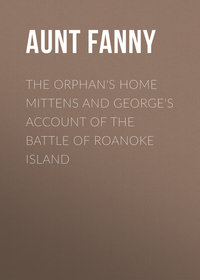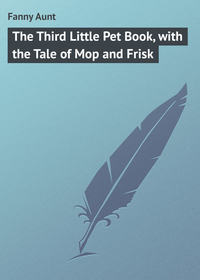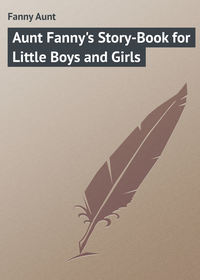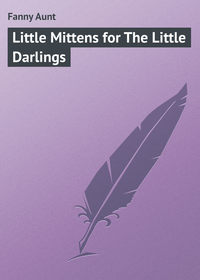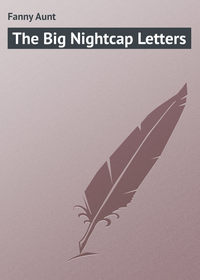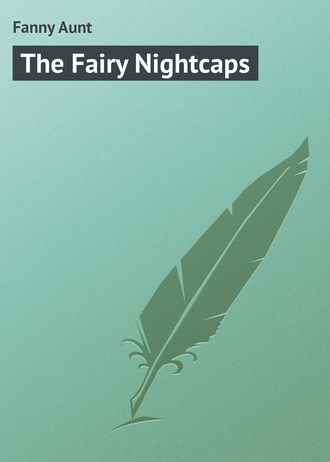 полная версия
полная версияThe Fairy Nightcaps

Fanny Aunt
The Fairy Nightcaps
PREFACE TO THE CHILDREN
Dear Children,
Here is the last Nightcap book, making six in all. The story of "The Three Little Fishes" was taken (but very much altered) from a clever book for grown folks, written, I believe, nearly two hundred years ago; but all the rest is true, "real true."
I have written them out with my heart full of love and good wishes for you, and you, and YOU; and my only desire in return is, that down in a cosy corner of your dear little hearts, you will keep warm, one kind thought of your loving
AUNT FANNY.
THE FAIRIES' LIFE
In the deep shadow of the Highlands, at the foot of the old Crow Nest Mountain, is a wild and beautiful hollow, closed around on every side by tall trees, interlaced together by the clasping tendrils of the honeysuckle, and the giant arms of luxuriant wild grape-vines.
The mossy edge of this magic circle is thickly embroidered with violets, harebells, perfumed clover-blossoms, and delicate, feathery ferns. A little brook, overhung with grasses and whispering leaves, dances and dimples in the bright sunlight and soft moonbeams, and then trips away, to offer the wild-rose leaves that have fallen upon his bosom to his beloved tributary lord, the great Hudson River.
Not a bat dare spread his unclean leathern wings across this charmed place, and the very owls that wink and blink in the hollow trees near by keep their unmusical "hoot toot" to themselves.
In the short young velvety grass, a starry daisy, or a sly little cowslip, peeps up here and there, but nothing else disturbs the lawn-like smoothness, save a tiny mound of green moss near the centre of the hollow, shaped marvellously like a throne.
It was the night of the eighteenth of June; and evidently there was something of importance about to happen in the beautiful hollow, for presently a train of glow-worms came marching gravely in, and arranged themselves in a circle around the mossy throne; while thousands of fire-flies flashed and twinkled through the trees. The soft, coquetting wind wandered caressingly among the flowers, and the moonbeams rested with a sweeter, tenderer light, upon the little brook which murmured and rippled, and gave back many a glancing, loving beam.
Suddenly a silvery tinkling bell was heard, like music at a distance. Twelve times it sounded; and immediately after an invisible chorus of sweet tiny voices were heard singing:
"Hasten, Elfin! hasten, Fay!From old Crow Nest wing your way;Through the bush and dewy brake,Fairies, hasten, for the sakeOf a mortal, whose pure breathSoon will fade, and sink in death:We for him sweet dreams will find,We will fill with balm the wind;Watch his young life glide away,Deck with beauty its decay —Till the closing earthly strife,Opens into heavenly life."Instantly the air seemed filled with streams of light like falling stars; the booming sound of humble-bees was heard, as fairy knights and ladies came hastening to the call through the moon-lit air; the knights pricking their chargers with their wasp-sting spurs, and the ladies urging theirs quite as fast with their sweet, coaxing voices.
The grave, elderly fairies, came more soberly. They crept out from under the velvet mullen leaves, and gravely mounted their palfreys, which were small field mice, and held them well in, with corn-silk bridles; for elderly fairies are inclined to be gouty, and don't like to do any thing in a hurry; like other people, they are apt to go too fast when they are young – and to balance the matter, are very slow coaches when they are old.
Several ancient ladies, who had been napping in a secluded nook at the root of an old tree, waited for their nutshells and four to be brought up; and as the coach-horses were represented by hairy, white caterpillars – who were so short-legged, that they took the longest possible time to get over the ground – and as the ancient fairies had much ado to fold their wings, and arrange their crinoline in their carriages, you may be sure they were very fashionably late.
And now a strain of delicious music filled the air, the glow-worms lighted up brilliantly, and the dew grew heavy with fragrance, as the Fairy Queen, with a bright train of attendants, floated past in dark green phaetons, made of the leaves of the camelia, and drawn by magnificently painted butterflies, harnessed and caparisoned with gold.
The dignity and queenly presence of her Majesty would have rendered her conspicuous above the rest, even if her tiny golden crown and sceptre, tipped with a diamond that blazed like a meteor, had not indicated that she was a monarch; and the acclamations that rose on all sides attested the attachment her subjects felt for her person.
She was indeed most lovely; and kind and generous beyond words to describe; and she had called her court together this very night to do that which makes both fairies and mortals lovelier and better, with every new effort. Do you know what it is? It is, trying to add to the happiness of another.
And now the Queen and her maids of honor gracefully alighted with the eagerly proffered assistance of the fashionable young fairy dandies; and the court gathered respectfully around, as the beautiful Queen seated herself on her throne, and gently waved her sceptre to command attention.
"My lords, ladies, and gentlemen," said her Majesty, in a voice of perfect music, "I have called you together three nights before our opening midsummer festival, because I know by my fairy power, that a mortal – a gentle, lovely boy – will arrive here to-morrow, across whose young life the harsh wings of pain and affliction have passed. For a month or more he has so drooped and faded, that I fear, before long, his pure life will be ended. His mother watches over him with the undying, untiring love, which only a mother knows. We can help her, my beloved subjects, and we will; we can steal the venom from his painful sleep, by giving him fairy dreams; and on our gala nights we will gently lift him from his couch, and bring him here. His sweet presence will cast no shadow on our festivities, so pure and lovely have been all the thoughts, words, and actions of his short life."
A murmur of pleasure rose from the as sembled court, and the good and beautiful Queen saw with delight, that her proposal had given pleasure to all her subjects, with one exception; and he was her very honest, but still more disagreeable prime minister, who, being a sour, meddlesome old bachelor, hated children. His temper was not particularly sweet just then, because he was making wry faces over an attack of the gout in his great toe, from indulging too freely in May-dew wine, and eating too often of roasted tiger-lily, which is a very highly seasoned dish, and difficult to digest, unless you take immediately after eating, half a dozen lady-slipper pills, which my lord the prime minister never would take, on account of the name – for of course, if he hated chil dren he hated the ladies also – and as I was saying, he felt very cross, and inclined to find fault with any thing anybody else proposed; so making as low a bow as his stiff back would permit, he began, with an abominable nasal twang: "May it please your Majesty, who is this child you deign to favor so highly?"
"He is called Lame Charley!" graciously answered the Queen. "He is the darling of all who know him."
"Are there any other children in the family, my liege?" snarled the prime minister.
"About three dozen, more or less," answered the Queen, frowning slightly, for she was not quite certain as to the number, and did not like to be questioned. "Humph!" grumbled the prime minister. Then muttering to himself, "Three dozen children! all eating dreadful pumpkin-pie – with cheeks like saddle-bags, and voices loud enough to make a mummy jump out of his skin in an ecstasy of astonishment at the noise! was there ever such a foolish freak?" whereupon, taking out his beetle-back snuff-box, and giving it the traditional taps, he helped himself to such a prodigious pinch, by way of consolation, that he was obliged to retire precipitately behind the honeysuckles, and nearly cracked his left wing by a tremendous fit of sneezing. For let me tell you that the pollen, or dust of the snap-dragon, properly dried, makes very powerful fairy snuff, and I advise you not to try it.
The maids of honor had great difficulty to keep from bursting out laughing at the flight of the cross old prime minister; and the Queen pretended to arrange her bodice, made of the gossamer wing of the katydid, to hide a smile; but now, reclining on her throne, and gracefully fanning herself with her right wing, she indulged in a pleasant chat with her favorites, about Charley.
"Dear Cowslip!" she began, "I am so interested in this lovely boy. Will you assist me to watch over him, and keep away all harm from his loving brothers and sisters? Particularly we will protect them from the Kelpies, those hateful water-sprites, who would drag them down to their dark caves beneath the wave, if once the children ventured upon their realm. We will bid their little mother to warn them from getting into row-boats, or wading out into the river; the Kelpies shall content themselves with water-rats and tadpoles for this time, for too many lovely children have already been sacrificed to their cruel spite."
"Ah, beloved Queen!" answered Cowslip, "I, for one, will help you with heart and will; those damp, wretched little goblins shall not hurt a hair of their heads."
"And I, with might and main, will do your behest!" said the handsome young Ripple, twisting his mustache.
"And I, gracious Queen!" cried the pretty Lota, "for I dearly love children."
"And I, your Majesty," said Beeswing with Ripple and Firefly, "will order our regiment – the seventh – to encamp under the sedges on the shore, half to keep watch, while the other half sleep in the swaying branches of the water-willows."
"Give us something to do for the dear children, dearest Queen!" cried Dewdrop and Lilliebelle, two of the most famous beauties of the court, and, what is far better, as good as they were beautiful; "let us also help to make them happy."
"Well said, fair ladies and brave knights!" exclaimed the Queen; "with such true and loyal assistance, my labor of love will be most delightful. Come now – to the dance – while they are preparing supper."
She clapped her tiny hands thrice, and immediately the fairy band commenced playing the most enchanting dances; and the beautiful hollow was speedily filled with couples, whisking away in such rapid evolutions, that you would have thought they would soon tumble head over heels, from sheer dizziness; but as the dances were, after all, not very different from ours, I suppose the fairies were quite as well used to the rushing style; and, in good truth, as they were fairies, it seemed more in keeping, for these rapid, gracefully undulating movements, were the very poetry of motion.
Of course the elderly gentlemen fairies lounged among the honeysuckles, and talked politics, and quarrelled dreadfully about who should be the next President; for they took an immense interest in the affairs of us mortals; and the elderly lady fairies just as much, of course, pulled the characters of their best friends to pieces, without so much as a single regret; while the lovely young Queen, with half-a-dozen of her favorites, after dancing once, to set the fashion, ordered her pages to shake down a perfect shower of wild-rose leaves, on the edge of the hollow, of which they made soft and freshly perfumed couches; and there they listened to the exquisite music, and watched the dancers, and gaily devised plans for the comfort of our dear little friend, Lame Charley.
While they were thus conversing, a queer little elfin sped down one of the moonbeams, like a flash of summer lightning, and in an instant was on his knee before the Queen.
It was the fairy, Slyboots, the Queen's favorite messenger, and the most mischievous sprite in her dominions.
"Welcome, good Slyboots," cried the Queen; "by your bright eyes and unsoiled wings, methinks you must have fulfilled our commands faithfully. How fared you? and how did you find our dear 'Nightcap' family?"
"Most gracious Majesty! I hurried to the great city, without folding wing; merely stopping a moment to torment a miserly old landlord, who, the day before, had turned a poor widow, with two little children, out of his tenement house, because she was not quite ready with the rent. I put a great fly on his nose, and a great flea in his ear, and ordered them to stay there, and buzz, and bite him, till he went nearly into fits."
A chorus of sweet fairy laughter greeted this mad-cap caper, and Slyboots embraced the opportunity to whisper something to a small brown spider, who had been listening with all his ears, and staring at Slyboots with all his eyes, of which he had more than his share, and who immediately scampered off with all his legs.
"Then, your Majesty," continued the elfin, "I hastened on, and flew through the window into the room where Charley slept. All was sweet, still, and hushed; and oh! how pure and lovely the pale boy looked, as he lay there, his hands folded across his breast. As I gazed, a radiant smile parted his lips, and a faint color came into his white cheek. He was dreaming – his soul was full of holy thoughts – and the smile had come, as he saw in his dream the Beautiful Home above, for which he was preparing.
"The little mother, looking wearied with watching, lay upon a couch near him. As I hovered over her, a large tear crept from under her closed eyelid, and a quick convulsive sob broke from her breast. She too was dreaming, dreaming of the sorrowful time when her darling would be taken from her.
"I swept my wings lightly across her brow, and bade her waken. She opened her eyes, looked upon Charley, and rising, with a sigh of relief, she murmured: 'I have thee yet, oh my child! my darling!' and hastening to him, she softly drew back the golden curls from his forehead, sprinkled a few drops of grateful, refreshing perfume upon his pillow, and then, tenderly touching his cheek with her loving lips, went comforted back to her couch.
"The rest of the children were in the other rooms, fast asleep in two-story cribs, and various dear little beds; and I left some of them laughing merrily in their sleep, by telling them one or two ridiculous anecdotes about your Majesty's stuffy old prime min – "
"Silence, Slyboots!" cried the Queen, trying not to laugh. "You shall not make fun of our minister to our face. Go and order the supper."
Slyboots grinned sideways at the maids of honor, but bowed, with a great show of penitence, to his Queen. Retiring from the presence, he placed a tiny bugle, fashioned out of a small honeysuckle, to his lips, and blew a shrill, peculiar blast.
It was perfectly well understood, for in an instant, a hundred small pink and white mushrooms sprang out of the earth, making the most delightful little tables imaginable, quite equal to the finest satin-wood, upon which the fairy servants and pages hastened to place dishes of rose-leaves filled with honey-dust, and golden buttercups of sparkling May-dew, which, having been bottled up for six weeks, foamed and effervesced, and gave out a most exquisite aroma.
This was for the young fairies, who cared only for sweets. The elderly fays were to be feasted upon broiled fly's legs, brought up hot, and each one was rolled up in a leaf of pepper-grass, which gave them a very piquant seasoning. These were garnished with small pearls, steeped and softened in crab-apple vinegar, sharp enough and sour enough to draw squeals from a Ja panese ambassador, who never smiles or squeals at any thing.
When all was ready, the fairies sat down at the tables, in pleasant little parties of four and six, while the band played the most admired fairy opera airs. But before the banquet was through, I am sadly afraid some of the gay young fellows forgot they were in the presence of ladies, they laughed so loud, and talked so much nonsense, and one of them came very near upsetting the table at which he sat, spilling his buttercup of dew all over the new gossamer dress of Lilliebelle, who was next to him.
But this was nothing to the uproar which arose when the old prime minister, who had been eating flies' legs, and little pearl pickles, till he could scarcely breathe, attempted to leave his seat. The little brown spider, sent by that mischievous Slyboots, had been hard at work fastening his wings together in a net, and then tying them in a most complicated cobweb knot to the honeysuckle vine just behind him. The old prime minister fairly howled with rage; he turned and twisted from side to side; he kicked and made awful faces at Slyboots, who was giggling and laughing, and shaking his wings with glee at a safe distance. An impudent mosquito came past, and sneered out in his abominable nasal drone, "You don't seem to like a net any better than I do;" while myriads of midges up in the air danced around him, singing, Why-don't-you-get-out? Why- don't-you-get-out? Why-don't-you- get-out? to which myriads of others answered, He-would-if-he-could-but- he-couldn't! He-would-if-he-could-but-he-couldn't! He-would-if-he- could-but-he-couldn't!
At last the Queen, who had been giving some private orders, inquired what all the noise and laughter meant; and, in great anger with Slyboots for thus turning her old prime minister into ridicule, ordered the saucy goblin to draw his sword and release the old minister. The young fairy knights hastened to help, for they all liked Slyboots, and a tremendous slashing and cutting at the cobweb net ensued, which speedily released the poor old prime minister, who went off breathing fury and vengeance.
But hark! What is that? A faint, far-off tramp is heard; the galloping hoofs of the steeds of the morning were sounding in the eastern sky, and the stir of their coming rustled the leaves that crowned the tops of the grand old trees. The first cock-crow was heard in the distance, and the fairy sentinels sounded the coming of the dawn loud and clear on their great morning-glory trumpets, from the top of old Crow Nest. The sky became dappled, and a rosy streak marched up to the zenith like the banner of a herald.
Up sprang the knights and ladies and mounted their chargers; the Queen and her maids entered their phaetons; the elderly fairies made what haste their dignity per mitted to their nutshells and four, and field-mice palfreys, and away they all sped; some through the air, some through the velvety grass; banners flying, and music playing, until naught was left but a shining trail that melted into the first bright golden beam of the morning.
THE CHILDREN'S LIFE
It was early in the sweet summer time. The young green leaves were bending over, and tenderly caressing the budding fruit and flowers, and the air was balmy with orchard blooms.
Your old friends, the Nightcap children, were as merry and happy and well as ever, except Charley – poor lame Charley. He was much worse; his sufferings had greatly increased with the dreadful hip disease, and a terrible cough racked his delicate and wasted frame. Death had been coming slowly on for a long time; but now he hastened his footsteps, and Charley knew that he should never see another summer in this world. He was not afraid to die – oh, no! the guileless, holy life of the gentle boy had robbed death of its sting. He well knew that this life was but a small part of our career, and the separation from those he loved so well, would be short. His faith in his Saviour was perfect and entire. He would soften the pang of parting to those left behind, and He would guide them with unchanged love to their darling in heaven.
The good little mother was advised by the doctor to take Charley into the country, somewhere up the beautiful Hudson River, among those grand old hills where the air is so bracing and pure.
It happened, fortunately, that one of her oldest friends, who was an officer at West Point, was obliged to leave there upon some government expedition for about three months; and he offered his pretty cottage to his friend for that time. This was most delightful, as Charley could have far more comfort living in this way than in a boarding-house; and the rest of the children would not have to be tied up by the leg to the bedposts, because their noise disturbed other people.
So the little mother gladly and gratefully accepted the offer, and was now very busy making up dozens of petticoats and panta loons, and coarse brown aprons, and great sun-bonnets, buying copper-toed shoes, so that the children might go where they pleased, and do any thing they liked, except tumble into the river, or fall down a well to live with the bull-frogs.
A few days before they left, the grand Japanese procession took place in New York; and Minnie said, "Oh, mamma, please take us to see the Jackanapes," which made the rest laugh. So down Broadway they all went, looking like a boarding-school that took boys as well as girls, with the little mother marching like a captain at their head, and turned into a fine store, opposite the City Hall Park, that belonged to their uncle, where they had such an excellent view, that their faces were a perfect picture of wonder and delight while the procession was passing.
"Dear me!" exclaimed George, "I am nearly crazy with joy; I wish the Japanese would come every day. How funny! they all look like old women in black nightgowns!"
"And their heads have little top-knots, like Poland hens," said Henry; "and see that fellow sticking his foot on the edge of the carriage – look! his great toe is put in a thumb!"
At this they all laughed, and Harry, laughing too, cried out: "I don't mean that; I mean that they knit thumbs in their stockings, and stick their great toes in; – dear! how it must tickle!"
It was a grand sight. Many of the stores were decorated with numerous little Japanese flags, which consist of a large red ball in the centre of a plain white surface, and many Japanese lanterns were hung around. The soldiers looked and marched splendidly; and the fine music was enchanting. Guns were firing in the Park, and smoking and flaming like steamboat funnels: little boys were popping off squibs and crackers, and everybody seemed perfectly happy.
"Dear me!" cried Arthur, "I wish I could hear the speeches they intend to make. I suppose they will be stuck full of compliments, not a word of which the Mayor will understand; but, of course, he will bow a great many times to show that he agrees with it all: and then he, in return, will make a speech to the ambassadors, all flaming over with fine words and flummery, and the Japanese will bow all in a row like four-and-twenty fiddlers – and oh! how nice it will all be!"
When the children got home, they told Charley about the grand procession, all speaking at once; and one of them put on an old black gown of his mother's, and half shut his eyes, and would have shaved his head, if his mother had let him, to show Charley just how they looked; because he, poor little fellow, had to stay behind – he could not have endured the fatigue of that long day away from home. But his kind little mother never forgot him; she was de termined he should see something; so about eight o'clock that evening, two horses, with a nice comfortable barouche, were driven up to the door, and Charley was tenderly lifted in, and two large pillows were placed behind and at his side, and his mother and two of the oldest children were driven slowly down Broadway to see the illumination.
The street was crowded. Beautiful colored lanterns were hung here and there, and little Japanese flags fluttered in every direction. As they came near the great Metropolitan Hotel, where the Japanese were staying, the crowd increased, and a burst of delightful surprise broke from Charley and the rest, as the beautiful blazing windows came in view. In each of the several hundred win dows were fine Japanese lanterns of different colors and two little flags. Such a glittering and a fluttering as they made! and over the door was the word "Welcome," in blazing gas-burners, with the splendid flag of the United States on one side, and a great Japanese banner on the other. Everybody was shouting and hurrahing, and every up-turned face looked happy, but none so merry and joyous as the children in the carriage; their eyes fairly danced with delight, and their faces looked as if they had been illuminated too. All they wanted was to have two little Japanese flags fastened to their ears, and to be placed in the windows, to have beaten the lanterns and gas-burners all to pieces.


